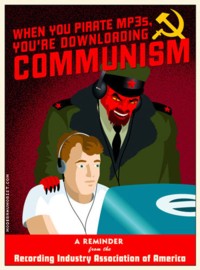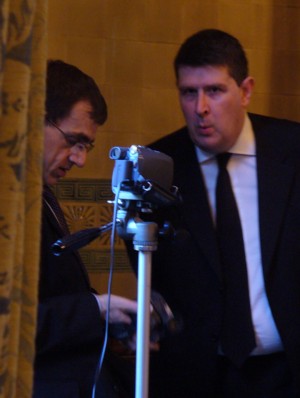We are developing the social individualist meta-context for the future. From the very serious to the extremely frivolous... lets see what is on the mind of the Samizdata people.
Samizdata, derived from Samizdat /n. - a system of clandestine publication of banned literature in the USSR [Russ.,= self-publishing house]
|
I believe in democracy because I distrust the elites. I distrust the elites because I believe that self-deception is widespread, and the elites are particularly skilled at it. Accordingly, I believe that it is important for those in power to have the humility of knowing that they may be voted out of office.
Others believe in democracy because they are hoping to see the triumph of a particular elite. Many liberals want to see sympathetic technocrats manipulating the levers of government, nominally for the greater good. I see government technocrats as inevitably embedded in a political system that inefficiently processes information. The more they attempt, the more damage they are likely to do. Many conservatives want to see government used for “conservative ends.” However, I believe that the more that government tries to correct the flaws of families, the more flawed families will become.
– Arnold Kling
Finally, thirty or so years too late, the Communists have come up with a slogan with makes Communism sound attractive:
Well, not quite. Actually this poster is a send-up of the attitude of the music industry, which is now engaged in suing the Russian-based online music website AllofMP3.com for $165 trillion.
This meme – downloading mp3 files for free is Communism! – is but the latest in a long line of similarly wrong-headed memes collusively created by stupid anti-Communists and not-so-stupid Communists, or not so stupid anti-anti-Communists (also scum in my opinion), which make Communism look and sound far better and far sexier than it ever really was or will be. Workers demanding the right to free association is Communism! Workers going on strike is Communism! Adolescents having sex is Communism! Rock and roll is Communism! Having fun is Communism!
Please note that I am not saying that downloading mp3 files for free (or for that matter going on strike or having sex) is necessarily right or wise, merely that it is very attractive, and in a way that Communism never was. I mean, for starters, how many people, under actually existing Communism, had the kit to download, legally or illegally, and then listen to mp3 files?
I tried copying the above poster from this website, but I couldn’t make that work. So, I googled it and found it from somewhere else. Does someone perhaps have something against people downloading picture files for free? (LATER: the downloading of that poster is not a problem, see comments, but just a problem for me and my photo-processing software. Apologies.)
And a “Long Tail” discussion is about the England cricket team presumably.
– Michael Jennings commenting on this at my blog this morning. Last night, England’s 7, 8, 9, 10 and 11 managed a total of four runs between them.
Photoed outside Parliament this afternoon:
Rob Fisher has an interesting posting up about police harassment, as displayed in a reality TV show. Basically, the police took it upon themselves to mess with some apparently quite innocent citizens, fishing for crimes that they might have committed. And it turned out one of them had apparently done something evil. He had, apparently, committed the crime of failing to be on the police driver database. Said the policeman: “You don’t exist” …It turned out that the database did contain him, but spelt slightly differently.
Rob Fisher is depressed about all this. But what I think this episode – by which I mean not just the police harassing people, but it being on television, and Rob Fisher copying out what they said and blogging about it – is that one of the benefits of total surveillance (see my immediately previous post) might be that the authorities might find themselves having to behave rather better.
On Saturday January 6th of what is still next year – Happy New Year when it comes everyone! – I will be giving the first of Christian Michel’s talks in his 6/20 Series of the year 2007. My talk will be entitled “Getting to grips with the Total Surveillance State and the Total Surveillance Society”. And for reasons which will become all too clear if you read the rest of this posting, I would appreciate some help. Last week I sent Christian the rather long and discursive ramble below concerning my thinking on this subject, which he had to shorten to turn it into a useful email announcement. What follows is a very slightly amended and extended version of that original ramble. As I say, all pertinent answers to and comments on the many questions I am now asking myself would be greatly appreciated… by the way, I already know that I need to be paying a lot of attention to this guy.
Some talks are given because the speaker has something important to say, and is very confident about what that something is, and that it is important. The first talk I gave to the 6/20 Club (on January 6th 2006) was of this sort. Oh, it had blurry edges, as all talks will, but the central thesis was something I was really pretty sure about and still am, namely that A-bombs and H-bombs had turned major war from something that Great Powers had to prepare for at all cost, into something they had to avoid at all cost. Hence globalisation. A nice and clear, nice and understandable thesis. Not necessarily right, but if wrong, then wrong in a nice clear way.
But then there are the talks such as the one I will be giving on January 6th 2007, which I am giving not because I know what to say about the Total Surveillance State and the Total Surveillance Society, but because I do not, but want to find out. About the only thing I am sure of concerning this topic is that it is an important topic, and worthy of all our best efforts to make sense of it. And if I agree to talk about this topic, I will have to think about it, no matter how much of an effort that may be.
Here are some of the questions, points, thoughts now rattling through my head on this topic:
- Total Surveillance is definitely on its way. Saying that the technology won’t work is delusional. Sure, governments waste millions on technology, but it eventually works, if only because eventually you can buy the necessary kit in the High Street. On the other hand, so long as progress persists, new kit will means new blunders, neand w surprises (often nasty) about what it can be used for.
- The USSR tried totally to control economic outcomes. Can its abject failure illuminate what I now sense will be a similar failure to control safety outcomes and crime outcomes? Crime statistics certainly have a USSR steel production feel to them.
- Is total surveillance such a bad thing? Maybe not, if the only laws and behaviour enforcements are modest in scope, and very reasonable. But total surveillance enforcing crazily voluminous and tyrannically intrusive laws is very bad news.
- In general, what happens to the world when everyone else can easily learn anything in particular about us that they want to learn? What social institutions falter? (Marriage? Insurance?) Is privacy a human right or a mere historical phase? A phase which now may be passing?
- Is celebrity obsession a pre-echo of a world in which all are potential celebrities, due to the ubiquity of completely invisible and unblockable cameras and microphones?
My main conclusion so far is that Total Surveillance will mean very different things depending on what else happens along with it. You cannot analyse the phenomenon in isolation.
For instance, just who will be allowed to browse through all those sound and vision files. Will it be everyone? Or only a self-appointed elite? Both arrangements have major hazards attached to them.
Since writing the above stuff to Christian, I have begun to fixate on another question, which is this: What does an individual have to gain by being totally surveilled? Fewer aggressive attacks against him is an obvious answer. Insurance premiums might be another. (If you live a totally safe and careful life, you might gain greatly if your insurance company can see this for themselves.) But I suspect that there are many other answers. (Simple showing off springs to mind.) Which is why I think that a great deal of, if perhaps not total, surveillance is probably here to stay.
As already stated above, I wish all of Samizdata’s readers a Happy New Year, but fear that for many of them, the above thoughts will have done little to contribute to such happiness.
Apologies for not flagging up sooner that I recently had a recorded conversation about Samizdata with Perry de Havilland. It took me over a week to edit the thing, by which I mean over a week to get around to stitching the two chunks it happened in together (I find everything involving computers to be hard until I know how to do it). And after posting about it on my blog, it has taken me another two days to mention it here. I had a busy weekend. But the mills of Samizdata grind small, and slowly. A week and a half’s delay will make no huge difference to the big picture, or to the meta-context as Perry likes to call it.
Anyway, click here to have a listen. It lasts about forty minutes.
Our conversation reminded me of something I first heard myself say to Madsen Pirie a long time ago, in the old Alternative Bookshop. What will this achieve? – said Madsen, waving some pamphlet I had just done in my face. I replied: “In the short run, nothing. In the long run, everything.” Samizdata is like that.
Jackie D liked it too.
Today, assuming the plan goes according to plan, I will be doing another of these things, with Alex Singleton, about… Gilbert and Sullivan. There is more to life than what governments do.
I oppose arts subsidies not only because arts subsidies are thieving from people who do not want art thank you very much, although it is that of course. I also oppose arts subsidies because I really like art and I think arts subsidies damage art, by separating artists from audiences and by separating nob audiences from yob audiences, the aristocracy from the groundlings. With arts subsidies, you get High Art in one tent – precious, clever, obscure, self-regarding and pretentious, and expensive; and Low Art, brain-dead trash, in the other bigger tent. Without arts subsidies, they all go into the same tent and you get, well: Shakespeare basically. Shakespeare, nineteenth century classical music, the great nineteenth century novelists, twentieth century cinema (before that too got to subsidised into Posh and Trash), twentieth century pop music, all that is artistically vibrant, fun and profound.
So, arts subsidies are really bad, both morally and artistically. And the good news is that, at any rate here in Britain, they are about to be “cut”, which is a cultural word meaning “not increased very much”. And who or what do we have to thank for this semi-excellent circumstance? Why, the Olympic Games:
The Treasury has warned of a tough spending round and the Culture Department has let it be known that there will be no extra money for the arts so long as the country is paying for the Olympics, a bill we will be paying well beyond 2012.
This means, at the very best, seven lean years of standstill subsidy for the arts and, at the worst, selective cuts that will drive some ensembles out of existence.
This is especially good news when you bear in mind that “so long as the country is paying for the Olympics” and “well beyond 2012” actually mean “for ever”.
The trick with sport is to enjoy it when it goes well, and when it goes badly, then it is only a game.
So, let me and all English cricket fans enjoy this, while it lasts:
The big surprise there is Paul Collingwood. Collingwood (or “Coll’wood” as Ceefax calls him) is one of those cricketers who is distinguished not so much by his skill as by his determination. He is skilled, of course he is. But the mental application to make the most of his skill is what made the England selectors back him to come good as an international cricketer. Until he made that score, the more casual observer of the game just did not think him capable of such a thing. Yet Collingwood, amazingly, is now the first Englishman to have made a test match double century in Australia since Walter Hammond did it in 1936. He and Pietersen put on 310 for the fourth wicket, their previous stand having been the only England bright spot in the first game.
Suddenly, Australia’s bowlers looked tired and old. The combined bowling analysis of McGrath and Warne for the last two days, neither of whom now seem to be fully fit, reads as follow: 83 overs 14 maidens 274 runs 1 wicket. Those two have been the backbone of the Australian bowling for the last decade, and those numbers are (in case you are wondering what on earth they signify) not good.
At midnight, or whenever it is, we will all probably be coming gently but firmly down to earth, when the Aussie batters begin to grind out a similar score, on a pitch which is apparently giving little help to bowlers.
But now there is at least hope for England. After the thrashing they got in the first game, a couple of days like the last two that England have had does wonders for team morale, and must also have somewhat deflated the Aussies. What if England’s bowlers also do better than in the previous game, and the Aussie batters do worse, when play resumes in a few hours?
Maybe this Ashes series will turn out as exciting and closely fought as the previous one, and for as long as that lasts, I can enjoy it. Yes, it is all only a game. But it is better not to have to be telling oneself this all the time, as was so very necessary throughout the previous game.
I can not have been the only blog-reader who was struck last week by the difference between this from Iain Dale:
The Browns must be shattered, particularly after the death of their daughter. Things like this bring politics into perspective and make some of the silly political games we all indulge in look absolutely pathetic. I am sure every single reader of this blog would want to put political differences aside and express their good wishes to the Brown family.
And this from Guido:
Now call Guido cynical if you will, but on the day the Charity Commissioners announce their intentions, and the Telegraph articles show the press chase has begun, we learn from a deftly placed story in the government’s favourite mouthpiece, The Sun, that tragically Gordon’s son has cystic fibrosis. A good day to front-page the tragic news?
Because yes, it would seem that there is some funding scandal surrounding Mr Brown which is now coming to the boil.
I think Guido wins. He does not deny the tragicness of the story. But, he notes the timing of the telling of it. He adds something. It is the full page spread in the Sun, which Guido reproduces, that clinches it for me.
And in the unlikely event that it was coincidence, then I am afraid that this is not the kind of benefit of the doubt that most of us are any longer prepared to give to this government.
Last Monday morning I did what I think was probably my best recorded conversation yet, with a man named Leon Louw. Here is the conversation we had, and here is the publication that Leon Louw was talking about. I recommend both with enthusiasm. Here is my bloggage about it all. Anyone even slightly interested in what distinguishes successful governments from failing governments, nice countries from nasty ones, will profit from following at least one of those links.
A few days before that, I did another recorded conversation, about the Libertarian Alliance and its workings, with Tim Evans, (pictured on the right here), who is now its President. Bloggage about that from me here.
And then last Tuesday, I had another of the regular conversations I have with Antoine Clarke about elections and related matters around the world, this time about the recent US midterms.
These conversations, especially the one with Leon Louw, have stirred me into setting up another of these things, with someone I have long wanted to talk with in this way, namely Samizdata’s own Perry de Havilland. I have just spoken on the phone with Perry and he has no objections to me flagging this up beforehand here nor to me asking the Samizdata commentariat if they have any questions that they would particularly like me to put to Perry. I do not promise to use every such suggestion, but all suggestions that do materialise will be considered.
This conversation will be happening this coming Saturday afternoon. Perry and I will be talking about what Perry did before Samizdata, what made him start it, about what it has been like doing it for the last five years, and about what effects it may or may not have had, during that time and in the future. That kind of thing.
I am going to start whatever preparatory reading I manage to do here.
There are quite a few fans of Sean Gabb who read this blog, so they might like to be told, if they have not been already, that Sean will be on 18 Doughty Street TV this evening between 9 and 10pm, discussing libertarianism. Sean is a fluent and experienced media performer and should be well worth seeing and hearing.
Here is a picture of him that I took last weekend, hatching who knows what plots with fellow Libertarian Alliance supremo Dr Tim Evans, at the LA’s Conference in the resplendent National Liberal Club.
Captions anyone? Mine goes: “One day all this will be ours! Ours I tell you!”
|
Who Are We? The Samizdata people are a bunch of sinister and heavily armed globalist illuminati who seek to infect the entire world with the values of personal liberty and several property. Amongst our many crimes is a sense of humour and the intermittent use of British spelling.
We are also a varied group made up of social individualists, classical liberals, whigs, libertarians, extropians, futurists, ‘Porcupines’, Karl Popper fetishists, recovering neo-conservatives, crazed Ayn Rand worshipers, over-caffeinated Virginia Postrel devotees, witty Frédéric Bastiat wannabes, cypherpunks, minarchists, kritarchists and wild-eyed anarcho-capitalists from Britain, North America, Australia and Europe.
|







